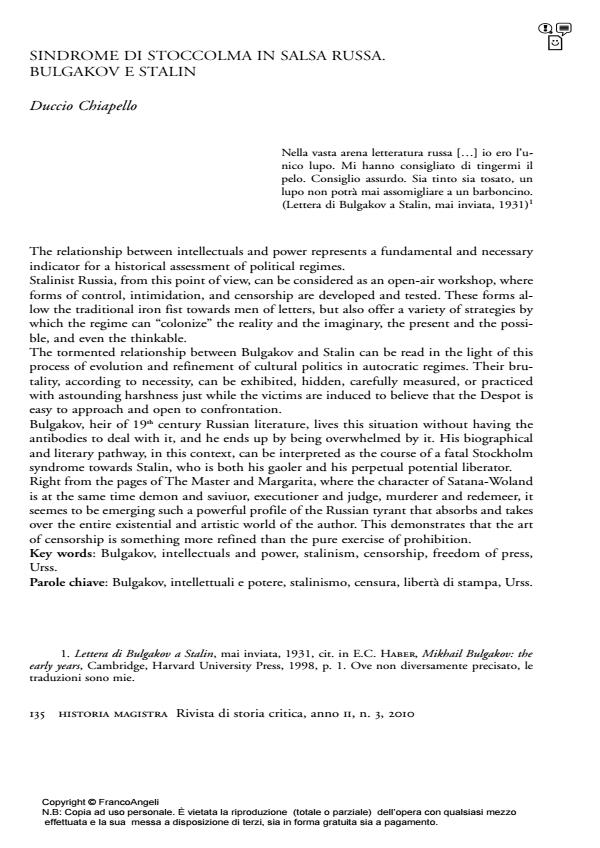Sindrome di Stoccolma in salsa russa. Bulgakov e Stalin
Journal title HISTORIA MAGISTRA
Author/s Duccio Chiapello
Publishing Year 2010 Issue 2010/3
Language Italian Pages 14 P. 135-148 File size 321 KB
DOI 10.3280/HM2010-003012
DOI is like a bar code for intellectual property: to have more infomation
click here
Below, you can see the article first page
If you want to buy this article in PDF format, you can do it, following the instructions to buy download credits

FrancoAngeli is member of Publishers International Linking Association, Inc (PILA), a not-for-profit association which run the CrossRef service enabling links to and from online scholarly content.
The relationship between intellectuals and power represents a fundamental and necessary indicator for a historical assessment of political regimes. Stalinist Russia, from this point of view, can be considered as an open-air workshop, where forms of control, intimidation, and censorship are developed and tested. These forms allow the traditional iron fist towards men of letters, but also offer a variety of strategies by which the regime can "colonize" the reality and the imaginary, the present and the possible, and even the thinkable. The tormented relationship between Bulgakov and Stalin can be read in the light of this process of evolution and refinement of cultural politics in autocratic regimes. Their brutality, according to necessity, can be exhibited, hidden, carefully measured, or practiced with astounding harshness just while the victims are induced to believe that the Despot is easy to approach and open to confrontation. Bulgakov, heir of 19th century Russian literature, lives this situation without having the antibodies to deal with it, and he ends up by being overwhelmed by it. His biographical and literary pathway, in this context, can be interpreted as the course of a fatal Stockholm syndrome towards Stalin, who is both his gaoler and his perpetual potential liberator. Right from the pages of The Master and Margarita, where the character of Satana-Woland is at the same time demon and saviuor, executioner and judge, murderer and redemeer, it seemes to be emerging such a powerful profile of the Russian tyrant that absorbs and takes over the entire existential and artistic world of the author. This demonstrates that the art of censorship is something more refined than the pure exercise of prohibition.
Keywords: Bulgakov, intellectuals and power, stalinism, censorship, freedom of press, Urss.
Duccio Chiapello, Sindrome di Stoccolma in salsa russa. Bulgakov e Stalin in "HISTORIA MAGISTRA" 3/2010, pp 135-148, DOI: 10.3280/HM2010-003012